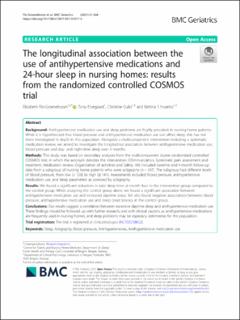| dc.contributor.author | Flo-Groeneboom, Elisabeth | |
| dc.contributor.author | Elvegaard, Tony | |
| dc.contributor.author | Gulla, Christine | |
| dc.contributor.author | Husebø, Bettina Elisabeth Franziska | |
| dc.date.accessioned | 2022-03-21T08:56:00Z | |
| dc.date.available | 2022-03-21T08:56:00Z | |
| dc.date.created | 2021-08-16T12:15:27Z | |
| dc.date.issued | 2021 | |
| dc.identifier.citation | BMC Geriatrics. 2021, 21 . | en_US |
| dc.identifier.issn | 1471-2318 | |
| dc.identifier.uri | https://hdl.handle.net/11250/2986357 | |
| dc.description.abstract | Background: Antihypertensive medication use and sleep problems are highly prevalent in nursing home patients. While it is hypothesized that blood pressure and antihypertensive medication use can affect sleep, this has not been investigated in depth in this population. Alongside a multicomponent intervention including a systematic medication review, we aimed to investigate the longitudinal association between antihypertensive medication use, blood pressure and day- and night-time sleep over 4 months. Methods: This study was based on secondary analyses from the multicomponent cluster randomized controlled COSMOS trial, in which the acronym denotes the intervention: COmmuncation, Systematic pain assessment and treatment, Medication review, Organization of activities and Safety. We included baseline and 4-month follow-up data from a subgroup of nursing home patients who wore actigraphs (n = 107). The subgroup had different levels of blood pressure, from low (< 120) to high (≥ 141). Assessments included blood pressure, antihypertensive medication use, and sleep parameters as assessed by actigraphy. Results: We found a significant reduction in total sleep time at month four in the intervention group compared to the control group. When analysing the control group alone, we found a significant association between antihypertensive medication use and increased daytime sleep. We also found negative associations between blood pressure, antihypertensive medication use and sleep onset latency in the control group. Conclusions: Our results suggest a correlation between excessive daytime sleep and antihypertensive medication use. These findings should be followed up with further research, and with clinical caution, as antihypertensive medications are frequently used in nursing homes, and sleep problems may be especially detrimental for this population. | en_US |
| dc.language.iso | eng | en_US |
| dc.rights | Navngivelse 4.0 Internasjonal | * |
| dc.rights.uri | http://creativecommons.org/licenses/by/4.0/deed.no | * |
| dc.title | The longitudinal association between the use of antihypertensive medications and 24-hour sleep in nursing homes: results from the randomized controlled COSMOS trial | en_US |
| dc.type | Journal article | en_US |
| dc.type | Peer reviewed | en_US |
| dc.rights.holder | © The Author(s), 2021 | en_US |
| dc.description.version | publishedVersion | en_US |
| cristin.ispublished | true | |
| cristin.fulltext | original | |
| cristin.qualitycode | 1 | |
| dc.identifier.doi | 10.1186/s12877-021-02317-4 | |
| dc.identifier.cristin | 1926294 | |
| dc.source.journal | BMC Geriatrics | en_US |
| dc.source.volume | 21 | en_US |
| dc.source.pagenumber | 9 | en_US |

